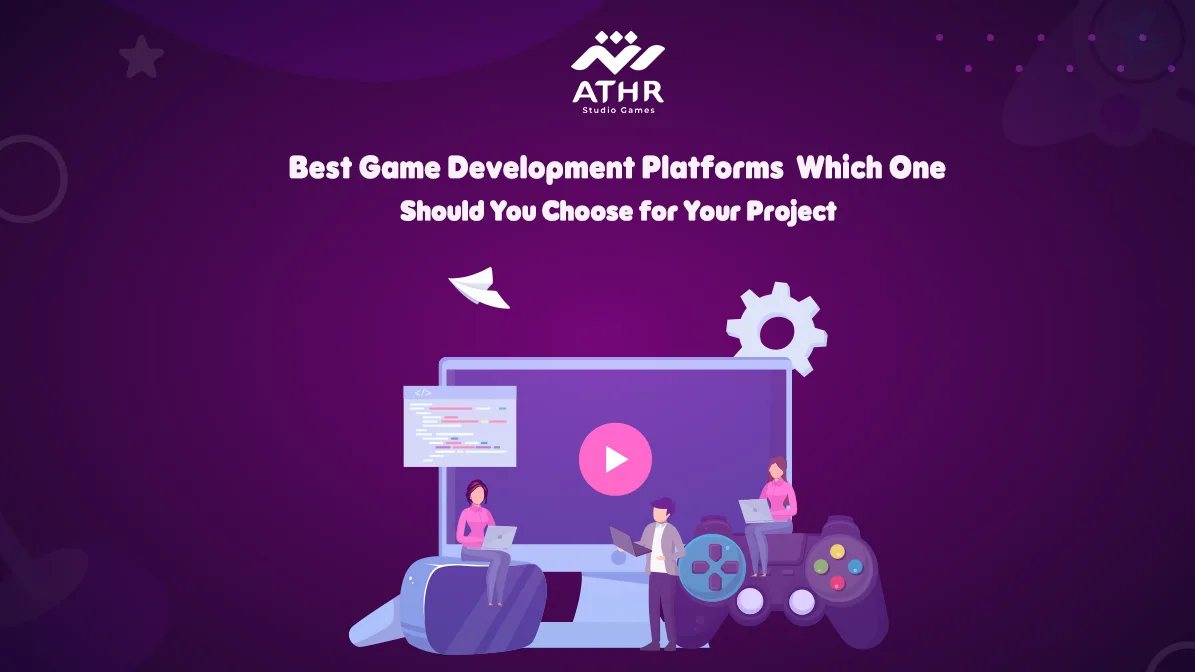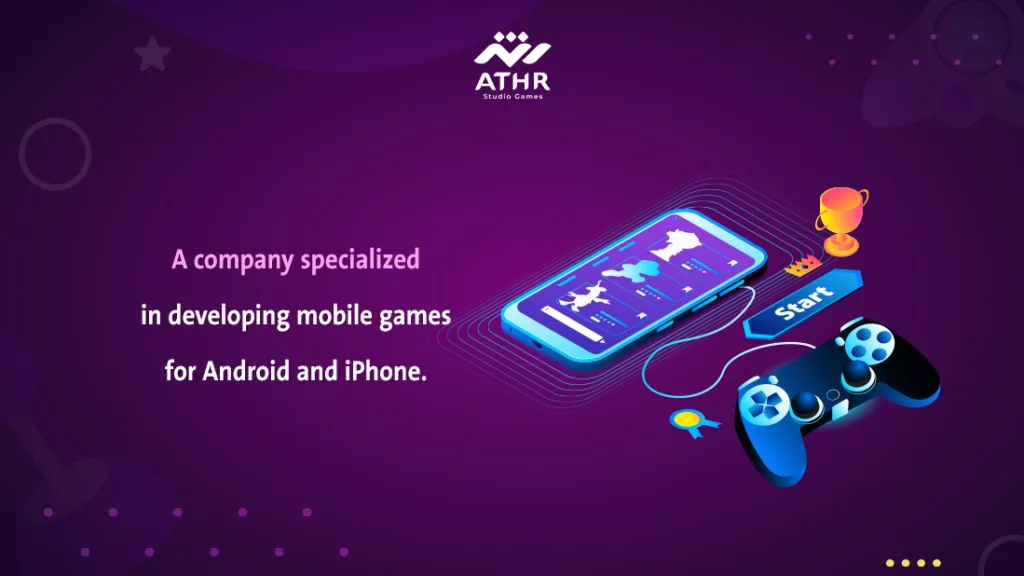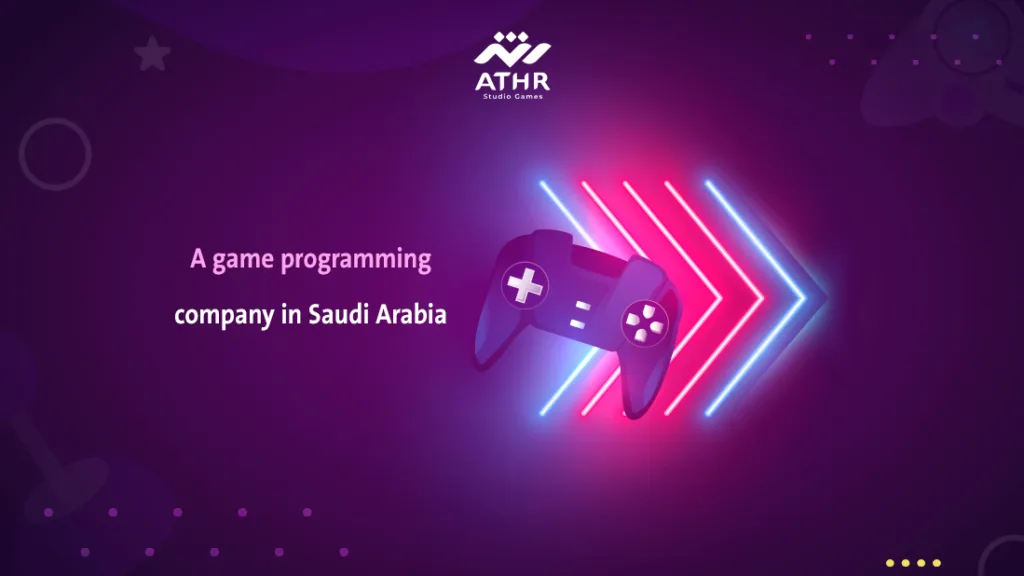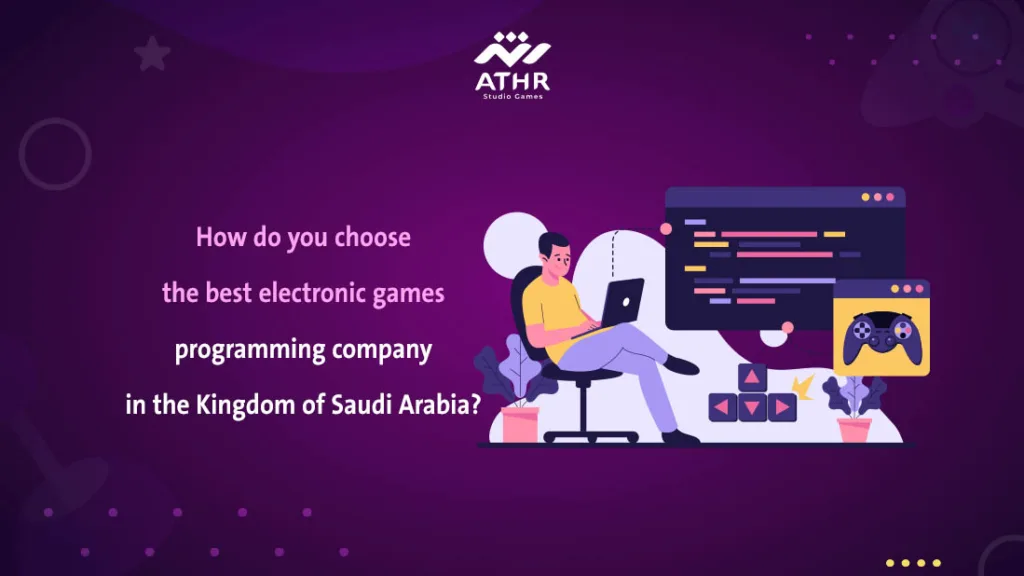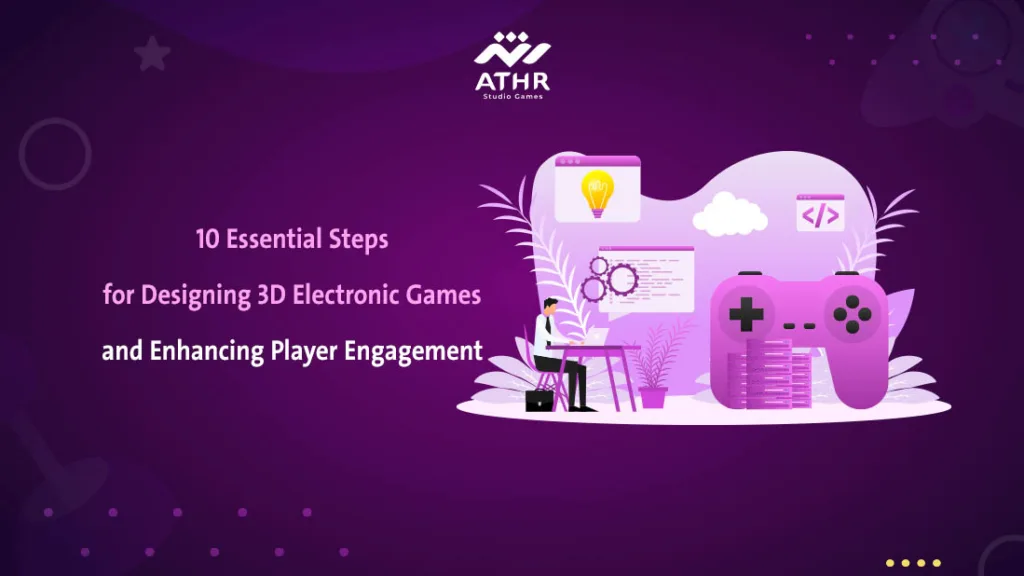Every successful game begins with one correct decision: choosing the right platform.
Game development platforms differ in terms of ease of use, graphics capabilities, and technical support, making the decision difficult for beginners and startups.
Whether you are developing your first game or building a massive project, knowing the difference between Unity, Unreal Engine, and Godot is the first step toward success.
What are Game Development Platforms and Why Do You Need Them?
Game development platforms are the software used by developers to easily build games without having to write everything from scratch.
These platforms provide ready-made tools for graphics, animation, sound, and artificial intelligence, making the development process faster and less costly.
Simply put, they are the environment where your idea transforms into a real, playable game on mobile, PC, or virtual reality devices.
Choosing the right platform from the start is the first step toward creating a successful and stable game in the market.
What Do Game Development Platforms Offer Developers?
These platforms are integrated software environments (Game Engines) that gather everything a developer needs in one place.
They provide tools for animation, lighting, physics, sound effects, and easy user interface design.
The most famous ones include:
- Unity: Ideal for developing mobile and 2D games.
- Unreal Engine: The best choice for realistic 3D games.
- Godot: A free, open-source option suitable for beginners and small projects.
💡Game development platforms are no longer limited to programmers; they are now accessible to everyone.
They are the tool that turns imagination into a playable, enjoyable experience.
Their Role in Facilitating Modern Game Programming and Design
The biggest advantage offered by game development platforms is that they unify all development stages in one location.
Instead of manually writing thousands of lines of code, these platforms allow you to use Visual Tools that enable you to:
- Animate characters and effects easily without the need for complex code.
- Adjust the game environment and add lighting and sound effects realistically.
- Test the game directly during development to correct errors instantly.
- Support Artificial Intelligence (AI), Augmented Reality (AR), and Virtual Reality (VR).
This is where the importance of choosing a powerful 3D Game Engine capable of delivering a stunning visual experience emerges, especially if you are targeting a professional gaming audience or action/open-world games.
💬Book your free consultation today.
How to Choose the Right Game Development Platform for Your Skill Level?
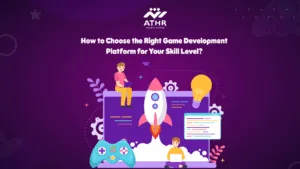
When thinking about game development platforms, the first question that usually comes to mind is: “Which platform is right for me?”
The answer doesn’t just depend on your desire, but on your skill level, experience, and the type of game you plan to build. Whether you are a beginner looking for simple tools to start your first game or a professional working on a large 3D project, choosing the right platform is the step that determines the success of your project in the market.
For Beginners: Simple, Easy-to-Learn Platforms
If you are at the start of your journey in game development for beginners, you will need an easy work environment, an intuitive interface, and abundant learning resources. Here are some platforms that are perfect for starting:
1. Unity – The Most Widespread Choice for Beginners:
- Relies on the relatively easy C# language.
- Provides a massive library of ready-made tools and 3D Assets.
- Contains thousands of free online tutorials, making it ideal for quickly learning the basics.
2. Godot Engine – The Free and Open-Source Platform:
- Requires no fees or licenses; it’s lightweight and fast.
- Supports simple programming languages like GDScript and Python.
- Ideal for creating 2D Games quickly and with low effort.
3. GameMaker Studio – An Excellent Option to Start Without Code:
- Allows game design using a Drag & Drop interface.
- Suitable for those who want to focus on ideas and graphics without diving into complex programming.
💡A Tip from Athr Company Experts: Don’t look for the most powerful platform, but for the one that allows you to learn and experiment easily. Your goal initially is to build a skill, not a massive game.
For Professionals: Powerful Platforms Supporting Large Projects
If you are a professional developer looking for 3D game engines to design powerful games like open-world or realistic action games, there are more advanced and robust options:
1. Unreal Engine – The Best for Realistic Graphics:
- Based on C++ language and supports Nanite and Lumen technologies for realistic graphics.
- Used in developing global games like Fortnite and PUBG.
- Offers advanced tools for physics, lighting, and cinematic effects.
2. CryEngine – For Visual Realism Enthusiasts:
- Provides an integrated experience in simulating light, nature, and environmental elements.
- Suitable for games that rely on precise visual details.
3. Amazon Lumberyard – For Cloud Services Integration Lovers:
- Allows easy connection of the game to Amazon Web Services (AWS) servers.
- Ideal for online Multiplayer Games.
🎯 The stronger the platform, the higher its technical requirements in terms of hardware, time, and programming skills. Therefore, make sure the platform you choose is compatible with your team’s resources and timeline.
Factors You Must Consider Before Making a Decision
Choosing the right game programming platform is not just about the name or fame, but about several strategic factors that determine your project’s success and sustainability. Here are the most prominent ones:
1. Available Budget:
- Some engines are free up to a certain profit threshold, then require a percentage of revenue (like Unreal and Unity).
- Paid platforms give you extra features like technical support and advanced services.
2. Game Type:
- Mobile Games require light performance and fast loading speed.
- PC or VR Games need engines capable of handling high-quality graphics.
3. Target Devices and Platforms:
- Ensure the platform supports publishing on the systems you are targeting (Android, iOS, Windows, PlayStation…).
4. Team Experience:
- There is no point in choosing a complex platform if your team is not proficient in its languages or tools.
- It’s always best to start with a platform familiar to the team to save time and cost.
🏆 Before starting any project, analyze your technical and commercial requirements, then seek the help of our game development experts at Athr to assist you in choosing the best platform that suits you in terms of performance, cost, and results.
A Comparison of the Most Popular Game Development Platforms on the Market
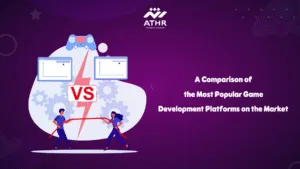
Before you begin building your game, it’s important to know that the game development platform you choose will determine the quality of your project, the ease of working on it, and even its market reach.
In this section, we will compare the most popular 3D game engines used today, such as Unreal Engine, Unity, Godot, and CryEngine, so you can choose the right game programming platform for your project level and budget.
Comparison: Unreal Engine & Unity – Which is Better for Your Project?
When we talk about professional game engines, these two giants cannot be ignored. Both Unreal Engine and Unity rank highest in game development worldwide, but each has features that distinguish it based on your project’s nature.
1. Unreal Engine – The Optimal Choice for Realistic Graphics and Massive Projects
- Used to develop games like Fortnite and PUBG, which illustrates its ability to handle complex 3D games.
- Based on C++ and offers advanced tools for AI and cinematic lighting.
- Ideal for games targeting powerful devices like PC, PlayStation, and Xbox.
- Delivers stunning realistic results thanks to Lumen for lighting and Nanite for detailed graphics.
2. Unity – The Best for Medium-Sized Projects and Mobile Applications
- Based on the easy C# language and is the most suitable for developing mobile games, VR, and AR.
- Supports publishing on over 25 platforms, making it a flexible choice for companies targeting a broad audience.
- Includes a massive Asset Store for ready-made components, which significantly speeds up the development process.
- Ideal for developers who seek to create games quickly and at a reasonable cost.
Comparison: Godot and CryEngine – Suitable Solutions for Independent Developers
If you are an independent developer or have a small team and are looking for a platform that gives you freedom, flexibility, and low cost, here is where Godot and CryEngine come in.
Godot Engine – The Ideal Platform for Independents and Small Projects
- Completely free and open-source.
- Supports easy programming languages like GDScript and C#.
- Excellent for creating 2D and 3D games quickly and at low cost.
- Features a simple interface and light performance suitable for mid-range computers.
CryEngine – Stunning Graphics at Low Cost
- Used in famous games like Crysis and Hunt: Showdown.
- Provides powerful tools for physics and realistic lighting.
- Requires advanced technical experience, but offers stunning visual results.
- Low licensing fees compared to competitors, making it attractive to professional developers with a limited budget.
Comparison Factors: Performance, Graphics, Ease of Use, and Community Support
To choose the best game development platform, you must compare them based on four key criteria that directly affect the development experience and the success of your game in the market:
| Factor | Unreal Engine | Unity | Godot | CryEngine |
| Performance | Excellent for large games | Good for medium and small games | Suitable for simple projects | Powerful but requires strong hardware |
| Graphics | Highest quality thanks to Lumen and Nanite | Very good and customizable | Acceptable, suitable for 2D and 3D | Extremely realistic |
| Ease of Use | Requires high programming experience | Easy to learn for beginners | Very simple and smooth | Medium to difficult |
| Community Support | Large and professional | The widest globally | Collaborative open-source community | Limited but specialized |
📌No single platform suits everyone. The ideal platform is one that meets your commercial and technical project goals.
Therefore, our team at Athr Game Development assists you in analyzing your needs and trying more than one engine before making the final decision.
📩 Consult Athr experts before you begin — We help you make the right decision that saves time and increases your game’s chances of success.
How Has Artificial Intelligence Changed the World of Game Development?
Game development no longer relies solely on programming skills and creative design; Artificial Intelligence (AI) is now the core driver that is completely changing the game’s rules.
Modern game development platforms are integrating AI technologies to provide smart environments that learn from player behavior and enhance the experience in real-time.
Whether you are a beginner developer or a company seeking to innovate a unique game, understanding the role of AI has become a necessity, not a luxury.
Smart Game Engines That Understand and Adapt to the Player
Have you ever imagined that a game could “understand you” and change according to your decisions? This is what AI is doing today in 3D game engines like Unity and Unreal Engine.
Here is how AI changes the development experience:
1. Player Behavior Analysis:
- Engines use Machine Learning algorithms to track player decisions, which helps automatically adjust the difficulty level and improve interaction.
2. AI in Controlling Enemies and NPCs (Non-Player Characters):
- Virtual characters have become more realistic thanks to AI systems that make them interact in diverse and unpredictable ways, increasing the depth of the experience.
3. Smart Customization of the Experience:
- Through AI, the game environment and gameplay style can be modified based on user preferences, making every experience unique.
💡 Relying on smart game engines raises the quality of your project and reduces development time, which makes your products more competitive in the global gaming market.
AI Tools in Enhancing Visual Experience and Interaction
AI is no longer limited to behaviors; it now plays a pivotal role in enhancing graphics, performance analysis, and visual interaction within the game.
- Improving Graphics and Lighting:
Technologies like DLSS and Ray Tracing AI enable engines like Unreal Engine to produce realistic graphics with cinematic quality.
- Procedural Generation of Content:
Maps, buildings, or entire levels can now be created smartly without significant human intervention, reducing cost and increasing development speed.
- Enhancing Sound and Human Interaction:
Many games today use AI for voice recognition or adding dynamic audio interactions, making the player experience more realistic and lively.
Ultimately, your choice of a game development platform is the step that determines the success of your project from the start.
Every platform—from Unity to Unreal Engine—has different strengths, but true success lies in choosing what suits your game idea, audience, and budget.
And with Athr Company’s expertise in developing 3D games and interactive projects, you can start with confidence.
Our team will help you analyze your needs and choose the right platform to bring your project to light with the highest quality and lowest cost.
Don’t postpone your idea any longer — 🎧 Contact Athr now and make your next game a new success story.

